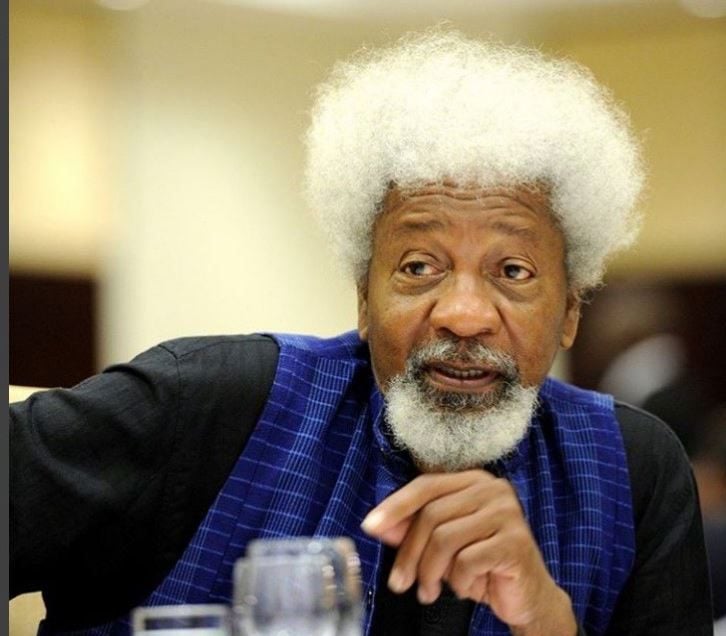Nobel laureate Prof. Wole Soyinka has explained why he turned down an invitation from the United States Embassy for a visa re-interview, revealing that the date fixed for the appointment — September 11 — made him uncomfortable.
Speaking during a media parley titled “Unending Saga: Idi Amin in Whiteface” at Kongi’s Harvest Gallery, Freedom Park, Lagos, on Tuesday, the literary icon said the date’s symbolism — marking the 2001 terrorist attacks in the U.S. — was unsettling to him.
“I didn’t like the date. Everybody knows what happened on that date, 9/11, many years ago. It is rather unfortunate that they picked that date. So, I said, ‘Sorry, I’m superstitious; I’m not coming on that day,’” Soyinka stated.

“My Visa Has Been Revoked”
The 91-year-old playwright disclosed that the U.S. authorities had revoked his visa, saying he chose to speak publicly so that those expecting him in the U.S. would know he had effectively been “banned.”
“It is necessary for me to hold this press conference so that people in the United States who are expecting me for one event or another do not waste their time. I have no visa; I am banned, obviously, from the United States. And if you want to see me, you know where to find me,” he told journalists.
Soyinka said the embassy informed him of the visa revocation in a letter dated October 23, 2025. The correspondence, he noted, cited U.S. Department of State Regulation 22 CFR 41.122, stating that his previously issued visa was “no longer valid for application for entry into the United States” due to “additional information” that became available after issuance.
The Consulate requested him to return his visa for physical cancellation, a request Soyinka dismissed humorously.
“They asked that I bring my visa to the embassy for cancellation. I found that funny. Maybe someone here would volunteer to deliver it for me,” he said jokingly.
According to the letter, Soyinka’s B1/B2 visa had been issued on April 2, 2024, in Lagos.

“I Owe the U.S. Nothing — They Owe Me Nothing”
Despite the development, Soyinka said he bore no grudge against the U.S. or its citizens.
“How old am I now? What am I looking for anywhere?” he said. “I have nothing against American citizens. Human beings live there — friends, families, colleagues. There are remarkable beings in that place.”
The Nobel laureate, who has spent several years teaching in the United States, said he had made significant intellectual contributions to the country and would not personally seek reinstatement of his visa.
“If circumstances change, yes, and if I’m invited, I may travel. But I won’t make the effort myself because there’s nothing I’m looking for there. I’ve given as much as I’ve taken. They owe me nothing, and I owe them nothing,” he said.
Soyinka revealed that he discussed the issue with the U.S. Ambassador to Nigeria, noting that he assured the diplomat that “there will be no reciprocal conduct” on his part.
“I told him both he and his staff are granted permanent visas to visit the Autonomous Republic of Ijegba in Abeokuta anytime they wish,” Soyinka said humorously.

Background of the Dispute
On September 10, 2025, Soyinka told PM News that he would not honour the U.S. Consulate’s invitation for the re-interview, scheduled for September 11, citing both disinterest and discomfort with the date.
“I was given a date to report with my passport. I declined. I made it clear I wasn’t going to apply for another date to bring in my passport. So, I travelled out,” he recounted.
Afterward, he received a letter from the ambassador and held a phone conversation with him.
“We arranged a call. Again, he offered a special visit by me at the Consulate. But I told him, ‘Shall I be equally frank with you? I’m not interested,’” he said.
Policy Shift on Nigerian Visas
Soyinka’s experience comes amid recent U.S. visa policy changes for Nigerian citizens.
In a statement released by the U.S. Embassy in Abuja, the mission announced that “most non-immigrant and non-diplomatic visas issued to Nigerians will now be single-entry visas with a three-month validity period.”
The embassy clarified that “U.S. non-immigrant visas issued before July 8, 2025, will retain their status and validity.”
Additionally, in August 2025, the U.S. Mission in Nigeria required applicants to disclose all social media usernames and handles used over the past five years as part of the visa screening process — a move it said was aimed at strengthening national security.
Prof. Wole Soyinka, best known as a playwright, poet, and essayist, became the first African to win the Nobel Prize in Literature in 1986.
He has held professorships at several U.S. universities and remains one of the world’s foremost voices for human rights, democracy, and artistic freedom.




